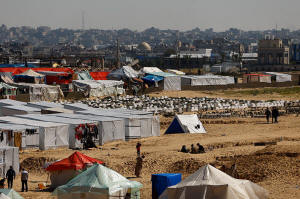Palestinians brace for Rafah assault as Israel promises evacuation plan
 Send a link to a friend
Send a link to a friend
 [February 10, 2024]
By Nidal al-Mughrabi and Henriette Chacar [February 10, 2024]
By Nidal al-Mughrabi and Henriette Chacar
DOHA/JERUSALEM (Reuters) -Israeli air strikes killed 17 people in Gaza's
Rafah overnight, medics said on Saturday, as over a million Palestinians
cramming into the border city await a full-blown offensive with the rest
of their enclave in ruins and nowhere left to run.
Four months into the war in Gaza, Israeli Prime Minister Benjamin
Netanyahu's office said it has ordered the military to develop a plan to
evacuate the population of Rafah and destroy four Hamas battalions it
says are deployed there.
Unlike in previous Israeli assaults on cities during the war, when the
military ordered civilians to flee south, no other relatively unscathed
area remains in tiny Gaza and aid agencies have warned that large
numbers of civilians could die.
"Any Israeli incursion in Rafah means massacres, means destruction.
People are filling every inch of the city and we have nowhere to go,"
said Rezik Salah, 35, who fled his Gaza City home with his wife and two
children for Rafah early in the war.
The conflict in Gaza began on Oct. 7 when Hamas gunmen stormed border
defences to attack Israeli towns, killing around 1,200 people, mostly
civilians, and dragging around 250 hostages back to Gaza according to
Israeli tallies.
Israel responded with a massive bombardment and ground offensive in
which about 28,000 Palestinians, mostly civilians, have been killed
according to medical authorities in Hamas-run Gaza.
Much of the enclave has been reduced to rubble, with Israeli forces
destroying swathes of towns with air strikes, artillery fire and
controlled detonations, leaving more than 85% of Gaza's 2.3 million
inhabitants homeless.
Most of the displaced have sought shelter in Rafah, in the far south on
the border with Egypt, but after ceasefire talks failed, Netanyahu this
week said Israeli forces would fight on until "total victory", including
in Rafah.

On Friday night an air strike on one Rafah house killed 11 people and
wounded dozens more, while a second strike killed six people in another
house, medical officials said.
In the other main southern Gaza city of Khan Younis, where many
displaced people initially fled before an Israeli offensive there last
month, the Palestinian Health Ministry voiced alarm at Israeli
operations around the main Nasser Hospital.
The ministry said Israeli forces had surrounded the hospital and were
shooting in the vicinity, and it was concerned about the fate of 300
medical staff, 450 patients and 10,000 people sheltering there.
Footage circulating on social media, which Reuters could not
independently verify, showed tanks at the hospital gates.
Israel's military said in an update on fighting on Saturday that its
forces were continuing "intensive" activities in Khan Younis as well as
northern and central Gaza, killing militants, seizing weapons and
striking infrastructure.
It did not immediately respond to a request for comment on the situation
at Nasser hospital.
RAFAH 'PANIC'
In Gaza City, the first major population centre that Israel's operation
targeted after ground forces invaded in late October, residents reported
fierce fighting on Saturday.
[to top of second column]
|

Displaced Palestinians, who fled their houses due to Israeli
strikes, take shelter in a tent camp, amid the ongoing conflict
between Israel and the Palestinian Islamist group Hamas, at the
border with Egypt, in Rafah in the southern Gaza Strip, February 8,
2024. REUTERS/Ibraheem Abu Mustafa

An Israeli official who declined to be named said that Israel would
try to organise for people in Rafah to be moved back northwards
ahead of any assault.
The continued warfare in Gaza City, months after it began and long
after Israel said it was redeploying some troops to other areas,
shows the limitations of any proposal to evacuate displaced people
from Rafah to other parts of the enclave.
Palestinian rescue workers in Gaza City said they had found the
bodies of a 6-year-old girl and her family members, along with the
ambulance team sent to rescue them, days after an audio clip of her
call to dispatchers begging for help was released.
Meanwhile doctors and aid workers are struggling to supply even
basic aid to Palestinians sheltering around Rafah. Many are trapped
against a border fence with Egypt and living in makeshift tents.
The United Nations said Palestinian civilians in Rafah require
protection, but there should be no forced mass displacement, which
is barred by international law.
"No war can be allowed in a gigantic refugee camp," said Jan Egeland,
secretary-general of the Norwegian Refugee Council, warning of a
"bloodbath" if Israeli troops move into Rafah.
The U.N. Palestinian refugee agency said it did not know how long it
could work "in such a high risk operation."
"There is a sense of growing anxiety, growing panic in Rafah," said
Philippe Lazzarini, the head of the UNRWA agency. "People have no
idea where to go."
Netanyahu's office said Israel cannot achieve its goal of
eliminating Hamas while it retains units in Rafah.
The statement, issued two days after Netanyahu rejected a Hamas
ceasefire proposal that included the release of hostages held by the
Palestinian militants, gave no further details.
Washington, Israel's main supporter, said it would not back an
assault that did not protect civilians, and had briefed Israel on a
new U.S. national security memorandum reminding countries receiving
U.S. arms to adhere to international law.
The Palestinian Presidency said Netanyahu's plans aimed to displace
the Palestinian people from their land.
"Taking this step threatens security and peace in the region and the
world. It crosses all red lines," said the office of Mahmoud Abbas,
head of the Palestinian Authority that exerts partial self-rule in
the Israeli-occupied West Bank.
(Reporting by Nidal al-Mughrabi in Doha and Henriette Chacar in
Jerusalem; Writing by Jonathan Landay and Angus McDowall; Editing by
Diane Craft and Toby Chopra)
[© 2024 Thomson Reuters. All rights reserved.]This material
may not be published, broadcast, rewritten or redistributed.
Thompson Reuters is solely responsible for this content.
 |